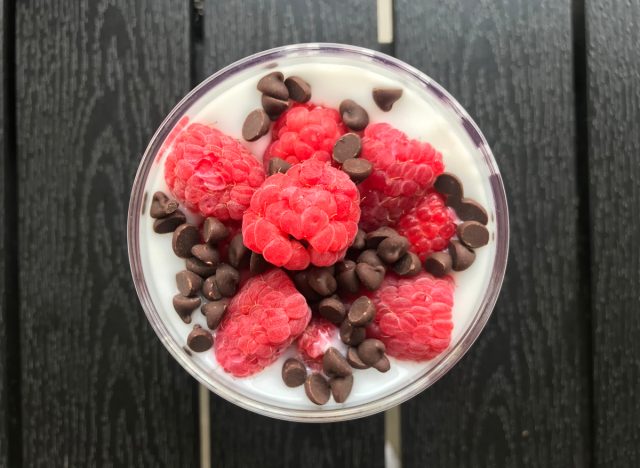A Dietitian's #1 High-Protein Breakfast Recipe

Looking for a high-protein breakfast recipe that will keep you full for hours while still being delicious? We've got you covered! As a dietitian, many of my clients want to increase their protein intake but are tired of boring options or lack time to cook every morning. My high-protein breakfast recipe solves both problems.
My favorite high-protein breakfast combines cottage cheese, yogurt, and protein powder in a triple threat of protein, ensuring you start your day with a satisfying and nutritious meal. Plus, you can even prep it ahead for easy weekday mornings. With 41 grams of protein per serving and a host of additional nutrients, this recipe supports your nutrition goals while providing essential fuel for optimal health.
High Protein Whipped Chocolate Mousse with Berries

Recipe for one serving
- ½ cup plain Greek yogurt (11 g protein)
- ½ cup cottage cheese (12 g protein)
- 1 scoop of chocolate protein powder (20 g protein)
- ½ cup raspberries
- 1 tablespoon chocolate chips
Nutrition (1 serving):
- Calories: 425
- Fat: 11 g (Saturated fat: 5 g)
- Sodium: 469 mg
- Carbs: 46 g (Fiber: 7 g, Sugar: 32 g)
- Protein: 41 g
How to make it:
- In a blender, combine cottage cheese, Greek yogurt, and protein powder. Add a little water if you want a thinner consistency.
- Blend until smooth.
- Add a tablespoon of chocolate chips and pulse quickly in the blender until roughly incorporated. We don't want to blend it completely, so the final product will still have some chocolate chunky textures.
- Top with raspberries or your favorite fruit and serve as-is in a bowl or glass with a spoon.
- If meal prepping: Pour the mousse into an air-tight container and store it in the fridge until you're ready to eat.
- Optional: Drizzle with chocolate syrup, a couple more chocolate chips, Chia seeds, or swap out for your favorite fruit. This could also easily be made with a vanilla protein powder or other flavors for variety.
RELATED: The 8 Best Cottage Cheese Brands, According to Dietitians
Why this high-protein breakfast recipe is beneficial:
This recipe packs a whopping 41 grams of protein per serving, a surefire way to stabilize your blood sugar and curb hunger until lunchtime. While protein is important, we don't want to neglect other macronutrients like carbohydrates and healthy fat. This recipe is balanced with carbohydrates, fiber from raspberries, vitamins and minerals, and healthy fat from cottage cheese and yogurt, making it a nutritionally balanced choice across the board.
Fiber and healthy fat offer more balance at breakfast by slowing down absorption, keeping you full for longer. Raspberries, in particular, are a rich source of fiber, with a whopping 9 grams per cup. Healthy fats from dairy can be beneficial for absorbing nutrients in our food, particularly fat-soluble vitamins.
The recommended protein intake for men and women is 0.8 grams of protein per kilogram of body weight per day, which equates to a recommended daily protein intake of 55-57 grams of protein for men and 47-48 grams of protein for women. Most women need significantly more than this, especially considering activity levels. Some research suggests we need as much as 2.2 grams of protein per kilogram of body weight per day. However, this recipe delivers 86% of the recommended daily protein intake for American women and 73% for men.
Protein has been shown to improve metabolism, appetite regulation, blood sugar stability throughout the day, reduce cravings, and more. The main reason protein is so impactful is because it takes a long time to digest so it hangs around in your stomach longer, giving you the feeling of fullness throughout the day.
Lastly, many people are tired of traditional protein breakfast foods like eggs, and this is the perfect recipe to swap up your morning routine without compromising your nutrition goals.
- Source: Richter, M., Baerlocher, K., Bauer, J. M., Elmadfa, I., Heseker, H., Leschik-Bonnet, E., Stangl, G., Volkert, D., Stehle, P., & on behalf of the German Nutrition Society (DGE) (2019). Revised Reference Values for the Intake of Protein. Annals of nutrition & metabolism, 74(3), 242–250. https://doi.org/10.1159/000499374
- Source: Stokes, T., Hector, A. J., Morton, R. W., McGlory, C., & Phillips, S. M. (2018). Recent Perspectives Regarding the Role of Dietary Protein for the Promotion of Muscle Hypertrophy with Resistance Exercise Training. Nutrients, 10(2), 180. https://doi.org/10.3390/nu10020180









